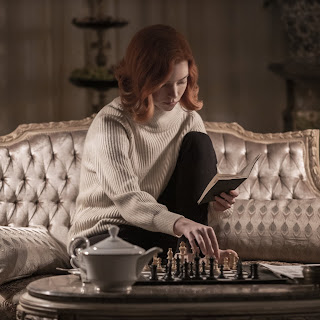Elizabeth Harmon as a mastery-oriented person
Today, I would like to look at how Elizabeth Harmon's motivation and success align with self-efficacy. Reeve (2009) defines self-efficacy as "a generative capacity in which the
individual organizes and orchestrates his/her skills to cope with the demands
and circumstances he/she faces" (p. 233).
- Personal history in trying to execute a particular behavior
- Observations of similar others who are trying to execute that particular behavior
- Verbal persuasions from others
- Physiological states
"Once enhanced, self-efficacy expectations provide the
cognitive-motivational foundation underlying personal empowerment: involves
processing the knowledge, skills, and beliefs that allow people to exert
control over their lives; occurs as efficacy and engagement replaced doubt and
avoidance" (Reeve, 2009, p. 241).
If a person manages to process the knowledge, skills, and believes and succeeds in exert control over his/her life, this person is mastery-oriented. If not, such a person is helpless-oriented. Below I want to show why I consider Beth to be a perfect example of a mastery-oriented person (with only brief moments of helplessness).
Beth is always learning from her mistakes. She goes over her errors and tries to figure out what could have been done differently. Moreover, she goes over her games even if there were no errors. Here is one example. Beth and her mother fly to Cincinnati for Beth's first Open. After a long day of chess playing, Mrs. Wheatley lays down in their hotel room to have a drink and watch TV. Beth sits down at the table and takes her portable chess board out. When Mrs. Wheatley asks what she is doing, Beth replies that she replays her games to look for weaknesses in them.
Observations of similar others who are trying to execute that particular behavior
Beth is always learning from mistakes which other players make. Or their victories. She comes to the room where the tournament happens first and leaves last. She looks at boards which were just left by players to see what their moves were. "I was so proud of myself when I found an error in a Morphy game," - she brags to her mother.
Beth is very lucky to always have someone by her side who supports her or gives her a piece of advice. After a couple of years in the orphanage she finds a mother who eventually becomes her agents and her best friend. She also finds many strong friends along her way. In fact, many of her opponents become her friends. She is acknowledged, she is praised, she is not alone. But most importantly, she knows how to persuade herself. During her very first Championship in Kentucky she plays Harry Beltik, the state champion. At some point, she realizes that she might lose this game. We can see that she is really upset and will start crying at any second. Without saying a word, she gets up and rushes to the bathroom. She takes her pills, looks in the mirror and says to herself in a very strong and angry tone: "Come on, you ugly piece of trash! You can beat that. I can get out of that." And she does. When she returns she bits Beltik and becomes famous.
One of the hardest things for Beth to control are, probably, her physiological and emotional states. After a very tough game with Benny Watts, she describes her state to her mother: "I thought he could see what I was planning. I thought he could hear my heart beating and knew how panicked I was... I wanted to win. I wanted to hammer his weakness... He forced an exchange of queens. I couldn't believe it. He caught me completely off guard. It was brutal." We see Beth crying and losing her emotions many times, but she always pulls herself together. She has many ways of doing it. Sometimes these ways are questionable. But she inevitably gains control of herself.
* * *
Beth Harmon goes through a long journey on her way to becoming the Grandmaster. She learns from her mistakes and overcomes many weaknesses. Along the way, she has support of many people. But most importantly, she learns how to find this support inside of herself. Once she learns how to do it, she finds this personal empowerment which helps her to succeed.
References
Reeve,
J. (2009). Understanding motivation and emotion (5th ed.). Hoboken,
NJ: Wiley.








Lovely explanation of self-efficacy! I really appreciate how she built her skills and self-efficacy together. So, her self-efficacy was not hollow, it was founded on her actual skills! I also appreciate the difficulty you paint with her regulating her emotions. It also shows the complexity of moment to moment cognitions and emotions!
ОтветитьУдалить